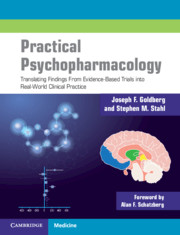 Practical Psychopharmacology
Practical Psychopharmacology from Part I - General Principles
Published online by Cambridge University Press: 19 October 2021
The relationship between food products and pharmacodynamically active agents traces at least to antiquity, even if Hippocrates never actually did say “let food be thy medicine and medicine be thy food” (Cardenas, 2013). In modern times the relationship between dietary supplements and medicine has come to pose a rather peculiar dichotomy between what might be called “legitimate” or “mainstream” medicine and nonstandard or “alternative” medicine. Interventions in the latter category suffer from issues of credibility due to an often less rigorous RCT database, at times poorly established rationales and/or mechanisms of action, and lack of regulatory agency product oversight for quality assurance purposes. Many patients obtain information about herbal products or dietary supplements simply from internet searches with little awareness of the scientific rigor or credibility behind advertising claims or consumer postings and testimonials, or cognizance of potential pharmacokinetic interactions.
To save this book to your Kindle, first ensure [email protected] is added to your Approved Personal Document E-mail List under your Personal Document Settings on the Manage Your Content and Devices page of your Amazon account. Then enter the ‘name’ part of your Kindle email address below. Find out more about saving to your Kindle.
Note you can select to save to either the @free.kindle.com or @kindle.com variations. ‘@free.kindle.com’ emails are free but can only be saved to your device when it is connected to wi-fi. ‘@kindle.com’ emails can be delivered even when you are not connected to wi-fi, but note that service fees apply.
Find out more about the Kindle Personal Document Service.
To save content items to your account, please confirm that you agree to abide by our usage policies. If this is the first time you use this feature, you will be asked to authorise Cambridge Core to connect with your account. Find out more about saving content to Dropbox.
To save content items to your account, please confirm that you agree to abide by our usage policies. If this is the first time you use this feature, you will be asked to authorise Cambridge Core to connect with your account. Find out more about saving content to Google Drive.